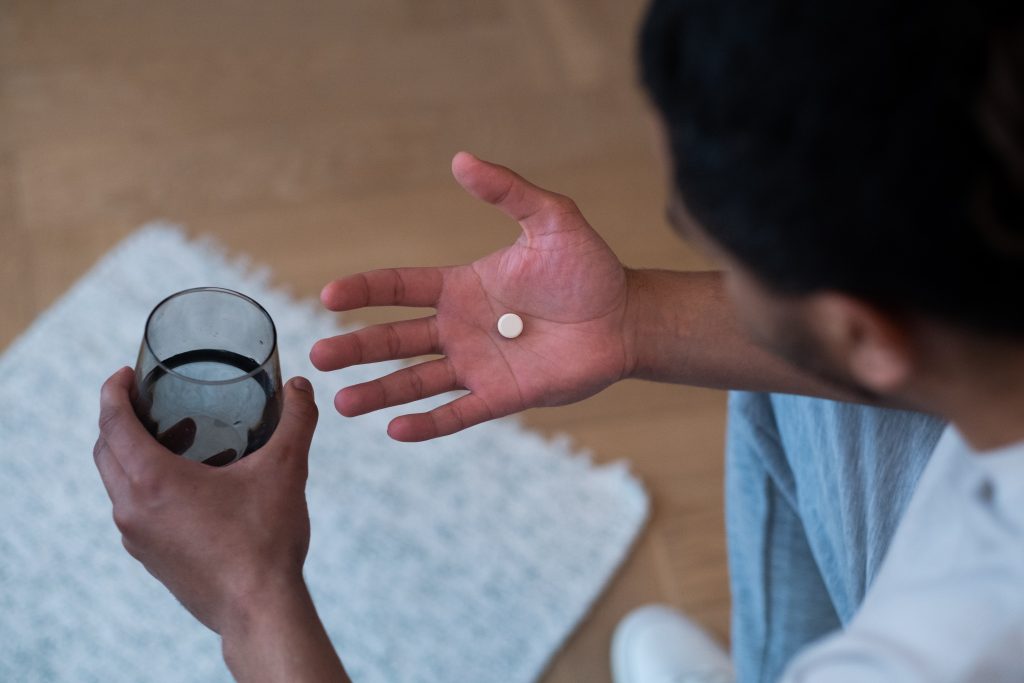Discover the potential impact of certain medications on testosterone levels.
Can Certain Medications Lower Testosterone Levels?

In the great game of life, hormones play a crucial role. They are the MVPs, the rockstars, the secret sauce that keeps our bodies functioning like well-oiled machines. Testosterone, in particular, takes the spotlight when it comes to men’s health. But did you know that certain medications can throw off this hormone’s groove? It’s like a plot twist in the testosterone tale that you didn’t see coming. So, let’s dive deeper into this medical mystery and uncover the truth about the connection between medications and testosterone levels.
Understanding Testosterone: Its Role and Importance
Before we unravel the medication-meddling mess, let’s get a proper grip on what testosterone is all about. Testosterone is the hormone that gives boys their deep voices, their impressive muscles, and their undying love for action movies. It’s a hormone that flaunts its influence in many areas of the male body.
What is Testosterone?
Testosterone, my friends, is the alpha of all hormones. It’s produced in the testicles and, to a lesser extent, in the adrenal glands. This superstar hormone is responsible for giving men their manly characteristics and is crucial for maintaining muscle mass, bone density, and red blood cell production. It’s like the VIP pass to masculinity.
But let’s dive deeper into the fascinating world of testosterone. Did you know that testosterone levels vary throughout a man’s life? During puberty, testosterone levels skyrocket, leading to the development of secondary sexual characteristics like facial hair, deepening of the voice, and increased muscle mass. As men age, however, testosterone levels gradually decline, which can result in a decrease in muscle mass, lower energy levels, and even changes in mood.
Furthermore, testosterone doesn’t just affect men physically; it also plays a crucial role in mental and emotional well-being. Studies have shown that testosterone influences mood regulation, cognitive function, and even the risk of developing certain mental health conditions. It’s like the conductor of a testosterone orchestra, keeping everything in perfect harmony.
The Function of Testosterone in the Body
Now, let’s talk about testosterone’s role in the grand scheme of things. This hormone is not just a pretty face; it works tirelessly behind the scenes to keep the male body in sync. Testosterone regulates sexual function, contributes to fertility, and even plays a part in mood regulation.
When it comes to sexual function, testosterone is the driving force behind a man’s libido and erectile function. It stimulates the production of nitric oxide, a molecule that plays a crucial role in achieving and maintaining an erection. Without adequate testosterone levels, men may experience a decrease in sexual desire and difficulties with erectile function.
But testosterone’s influence doesn’t stop there. It also plays a vital role in fertility. Sperm production is dependent on testosterone, and low levels of this hormone can lead to a decrease in sperm count and quality. This can make it more challenging for men to conceive with their partners.
Additionally, testosterone has been linked to mood regulation. Low testosterone levels have been associated with symptoms of depression, irritability, and decreased motivation. On the other hand, optimal testosterone levels can contribute to a sense of well-being, increased self-confidence, and improved overall mood.
It’s truly remarkable how testosterone, this powerhouse hormone, impacts so many aspects of a man’s life. From physical characteristics to sexual function, fertility, and even mood, testosterone plays a vital role in maintaining a man’s overall health and well-being.
The Connection Between Medication and Hormone Levels
Alright, buckle up, because here’s where things start to get twisty. Medications, those little life-savers that promise to fix our ailments, can sometimes unintentionally mess with our hormones. It’s like hitting a speed bump on the road to optimum testosterone levels. But how exactly can these medications wreak havoc on our precious hormone balance?
Let’s dive deeper into the fascinating world of medication and hormones. Think of hormones as an intricate system of dominos, delicately balanced to maintain our body’s equilibrium. When a medication enters the scene, it can knock these dominos out of line. Some medications interfere with hormone production, disrupting the delicate dance of chemical messengers in our body. Others meddle with hormone receptors, preventing them from receiving the signals they need to function properly. And then there are those medications that just throw a wrench into the whole hormonal machinery, causing a cascade of effects throughout our body. It’s like a pharmaceutical game of Jenga, where one wrong move can topple the testosterone tower.
Now that we understand how medications can mess with hormones, let’s focus on the star of our show: testosterone. Testosterone, often associated with masculinity and vitality, plays a crucial role in various bodily functions. However, some medications have a direct impact on testosterone levels, leading to a dip in our body’s testosterone supply. It’s like someone sneaking into the testosterone factory and turning off the production switch. And just like that, your favorite hormone takes a nosedive.
But which medications are the culprits behind this testosterone plunge? Well, it turns out that there are several classes of medications that can interfere with testosterone levels. For example, certain medications used to treat prostate cancer, such as androgen deprivation therapy, work by reducing the production of testosterone. These medications essentially put the brakes on testosterone production, causing a significant decrease in its levels. Similarly, corticosteroids, commonly prescribed for inflammatory conditions like asthma and arthritis, can also suppress testosterone production. It’s like a double whammy for testosterone, facing both cancer-fighting drugs and anti-inflammatory medications.
But it’s not just cancer and inflammation-related medications that can mess with testosterone levels. Some medications used to treat mental health conditions, such as antidepressants and antipsychotics, have been found to have an impact on testosterone. These medications can interfere with the delicate balance of hormones in the brain, potentially leading to a decrease in testosterone levels. It’s like a tug-of-war between mental well-being and testosterone production.
Furthermore, certain medications used to manage chronic conditions like high blood pressure and diabetes can also affect testosterone levels. For instance, beta-blockers, commonly prescribed for hypertension, have been associated with decreased testosterone levels. Similarly, some medications used to control blood sugar levels in diabetes, such as metformin, have been found to lower testosterone levels in certain individuals. It’s like a trade-off between managing chronic conditions and maintaining optimal hormone levels.
So, as you can see, the connection between medication and hormone levels is a complex web of interactions. Medications can disrupt hormone production, interfere with hormone receptors, and directly impact testosterone levels. It’s like a delicate dance between our body’s natural balance and the interventions we rely on to improve our health. Understanding these interactions can help healthcare providers make informed decisions when prescribing medications and managing hormone-related conditions.
Types of Medications That May Lower Testosterone
Now that we’ve got the backstory down, it’s time to shine a light on the culprits—the medications that have been known to lower testosterone levels. Brace yourself, because your medicine cabinet may be hiding some testosterone thieves.
But what exactly are these medications? Let’s dive deeper into the world of prescription drugs and over-the-counter medications, where the line between hero and villain becomes blurred.
Prescription Drugs and Testosterone
Prescription medications can be the heroes we need, but sometimes they turn out to be the villains we didn’t see coming. It’s a complex dance between finding relief for one ailment while unintentionally causing another.
One group of medications that has been linked to testosterone depletion is corticosteroids. These powerful anti-inflammatory drugs can work wonders in reducing pain and inflammation, but they may also disrupt the delicate balance of hormones in your body. It’s like a double-edged sword, combating one issue while creating another. Talk about a classic case of “prescription paradox.”
Another group of medications that may lower testosterone levels are opioids. These painkillers, while effective in managing severe pain, can have a suppressive effect on testosterone production. It’s a cruel twist of fate when the very medication that brings relief also dampens your body’s natural hormone production.
Over-the-Counter Medications and Testosterone
Now, don’t let that innocent-looking over-the-counter aisle fool you. Even seemingly harmless medications can have a sneaky effect on your testosterone levels. It’s like a magician’s trick, where the illusion of quick-fix relief hides a potential hormonal disruption.
One such group of medications is antacids. These over-the-counter remedies are commonly used to alleviate heartburn and indigestion, but they may also interfere with testosterone levels. The mechanism behind this interaction is not fully understood, but it serves as a reminder that even seemingly benign medications can have unintended consequences.
Similarly, certain antifungal medications have been known to play tricks on your testosterone. While they effectively combat fungal infections, they may inadvertently disrupt your hormonal balance. It’s like buying a shiny new toy but discovering it has a hidden button that turns off your stardom-inducing hormone.
So, whether it’s prescription drugs or over-the-counter medications, it’s important to be cautious and aware of the potential impact on your testosterone levels. Consult with your healthcare provider if you have concerns or questions about the medications you are taking and their effects on your hormone balance.
Symptoms of Low Testosterone
Now, let’s talk symptoms. How can you tell if your testosterone levels are playing hide-and-seek? Well, here are a few red flags that may indicate your hormone levels are taking a dip.
Physical Symptoms of Low Testosterone
When testosterone is running low, it can manifest itself in physical ways. Fatigue, decreased muscle mass, and changes in body hair distribution can become the unexpected (and unwanted) sidekicks of low testosterone. It’s like your body staging a rebellion against the hormone that once ruled.
Psychological Symptoms of Low Testosterone
But let’s not forget about the psychological side of things. Low testosterone can take a toll on your mental well-being. Mood swings, decreased libido, and even depression may crash the party when testosterone levels drop. It’s like inviting the Grinch into your hormonal holiday gathering.
Treatment and Management of Low Testosterone
So, what can you do if your testosterone levels resemble a sad game of limbo? Well, fear not, because there are ways to boost your testosterone back to its superstar status.

Testosterone Replacement Therapy
One possible solution is testosterone replacement therapy (TRT). This involves introducing synthetic testosterone into your system to supplement the natural testosterone your body produces. It’s like a hormonal superhero coming to your rescue, cape and all. However, TRT is not without its controversies, so make sure you consult with your doctor before taking the leap.
Lifestyle Changes to Boost Testosterone
But hey, why rely solely on synthetic hormones when you can give your natural testosterone a boost through lifestyle changes? Exercise regularly, maintain a healthy weight, and get enough sleep – these simple tweaks can work wonders for your testosterone levels. It’s like turning up the volume on your body’s testosterone playlist and dancing to the rhythm of hormone harmony.
So there you have it, folks. The not-so-fairytale truth about medications and testosterone levels. Remember, even though medications can sometimes throw a wrench into your hormonal symphony, there are ways to get back on track. So, keep those testosterone levels high and your spirit, even higher!








Can you be more specific about the content of your article? After reading it, I still have some doubts. Hope you can help me.